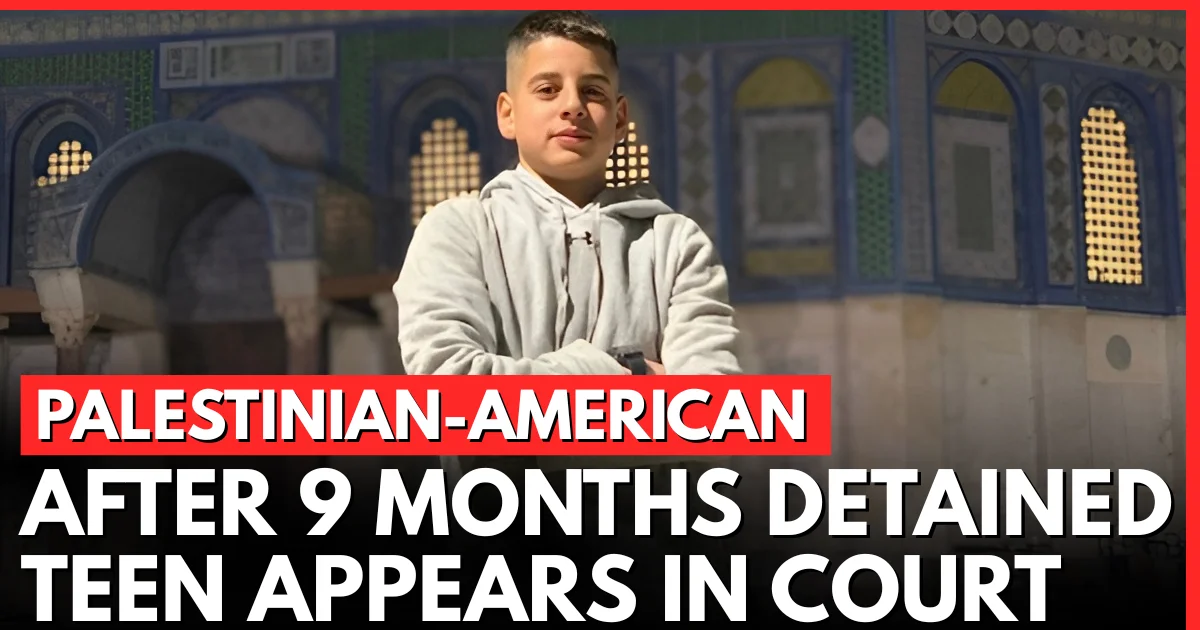A Palestinian-American teenager detained by Israel for nine months without formal charges finally heads to court. Learn what happens next. Read now.
Table of Contents
Palestinian-American Teenager Detained by Israel for Nine Months Without Charge Finally Appears in Court
A young American citizen of Palestinian descent has spent nine agonizing months behind bars in Israel without facing any formal charges. Now, the teenager is finally scheduled to appear before a court, raising serious questions about detention practices and US citizen rights abroad.
Who Is the Detained Palestinian-American Teen?
The case involves a teenage American citizen who holds Palestinian heritage. Israeli authorities detained the young individual months ago under controversial administrative detention laws.
Family members and advocacy groups have expressed deep frustration over the prolonged detention. The teenager’s loved ones say they’ve faced significant challenges obtaining clear information about the case.
American officials have reportedly been monitoring the situation. However, critics argue Washington hasn’t applied enough pressure to secure the teen’s release.
What Is Administrative Detention?
Administrative detention allows Israeli authorities to hold individuals without filing formal charges. This practice has drawn widespread criticism from human rights organizations worldwide.
Here’s how administrative detention works:
- No formal charges required — Authorities can detain someone based on undisclosed evidence
- Renewable indefinitely — Detention orders can be extended repeatedly
- Limited legal recourse — Detainees face challenges fighting their detention
- Secret evidence — Neither detainees nor their lawyers always see the evidence against them
Human rights groups estimate that hundreds of individuals currently sit in Israeli administrative detention. Many are Palestinian, though the practice has occasionally affected foreign nationals including American citizens.
Why This Case Matters for Americans
When a US citizen faces detention abroad, the State Department typically provides consular assistance. This includes:
- Visiting the detained citizen
- Ensuring fair treatment under local laws
- Communicating with family members back home
- Monitoring legal proceedings
However, cases involving administrative detention present unique challenges. Without formal charges, traditional legal processes don’t apply in the same way.
Advocacy organizations have urged the Biden administration to take stronger action. They argue that American citizens deserve robust protection regardless of where they’re detained.
The Upcoming Court Appearance
After nine months in custody, the Palestinian-American teenager is finally scheduled to appear in court. Legal experts say this hearing could determine several outcomes:
- Release — The court could order immediate release
- Formal charges — Prosecutors might finally file specific charges
- Extended detention — Authorities could seek continued administrative detention
- Modified conditions — The court might order house arrest or other alternatives
The teenager’s legal team has reportedly been preparing arguments challenging the detention’s legality. They’re expected to highlight the lack of formal charges and the extended time already served.
US Government Response So Far
The State Department has acknowledged awareness of the case. A spokesperson confirmed that consular officials have been involved.
However, some lawmakers have called for stronger intervention. They argue that nine months without charges violates basic legal principles that America champions globally.
Key questions remain unanswered:
- Has the US demanded specific explanations from Israeli authorities?
- What diplomatic steps has Washington taken behind the scenes?
- Will this case affect broader US-Israel relations?
Neither government has released detailed public statements about ongoing discussions.
Human Rights Concerns Mount
International human rights organizations have condemned prolonged detention without charge. Groups like Amnesty International and Human Rights Watch regularly criticize administrative detention practices.
Their main concerns include:
- Due process violations — Everyone deserves to know why they’re being held
- Psychological harm — Extended uncertain detention damages mental health
- Family separation — Loved ones suffer without answers
- Legal precedent — Such practices could expand if unchallenged
The teenager’s case has attracted attention precisely because American citizenship is involved. Advocates hope this visibility will pressure authorities toward resolution.
What Happens Next?
The upcoming court hearing represents a critical moment. Family members and supporters are watching closely.
Legal observers suggest several factors could influence the outcome:
- Evidence strength — What justification will authorities present?
- International pressure — Has US involvement affected Israeli calculations?
- Legal arguments — How persuasive is the defense team’s case?
- Political climate — Do broader diplomatic factors play a role?
Whatever happens, this case highlights ongoing tensions surrounding detention practices and the rights of dual citizens caught between nations.
FAQs
How long can Israel hold someone under administrative detention?
Israel’s administrative detention orders typically last up to six months initially. However, authorities can renew these orders indefinitely, meaning some individuals remain detained for years without facing formal charges.
What rights do American citizens have when detained abroad?
American citizens detained in foreign countries have the right to consular access. This means US embassy or consulate officials can visit them, monitor their treatment, and help connect them with local attorneys. However, Americans must still follow local laws and legal procedures.
Can the US government force another country to release an American citizen?
The US government cannot directly force sovereign nations to release detained citizens. However, Washington can apply diplomatic pressure, issue public statements, and use bilateral relationships to advocate for American citizens facing detention abroad.
What organizations are advocating for the detained teenager?
Several Palestinian-American advocacy groups and international human rights organizations have highlighted this case. These groups are pushing for the teenager’s release and calling for greater US government involvement in securing freedom for the detained American citizen.
Why hasn’t the teenager been formally charged?
Under administrative detention, Israeli authorities aren’t required to file formal charges. They can hold individuals based on classified security information that isn’t disclosed publicly. Critics call this practice fundamentally unfair and a violation of basic legal rights.
Conclusion
The case of this Palestinian-American teenager held by Israel for nine months without charge raises profound questions about justice, citizenship, and international law. As the court date approaches, all eyes remain on what happens next.
Family members continue hoping for a positive outcome. Advocacy groups keep applying pressure. And the broader world watches to see how this situation resolves.
Stay connected with our coverage for the latest updates on this developing story. Share your thoughts in the comments below.

